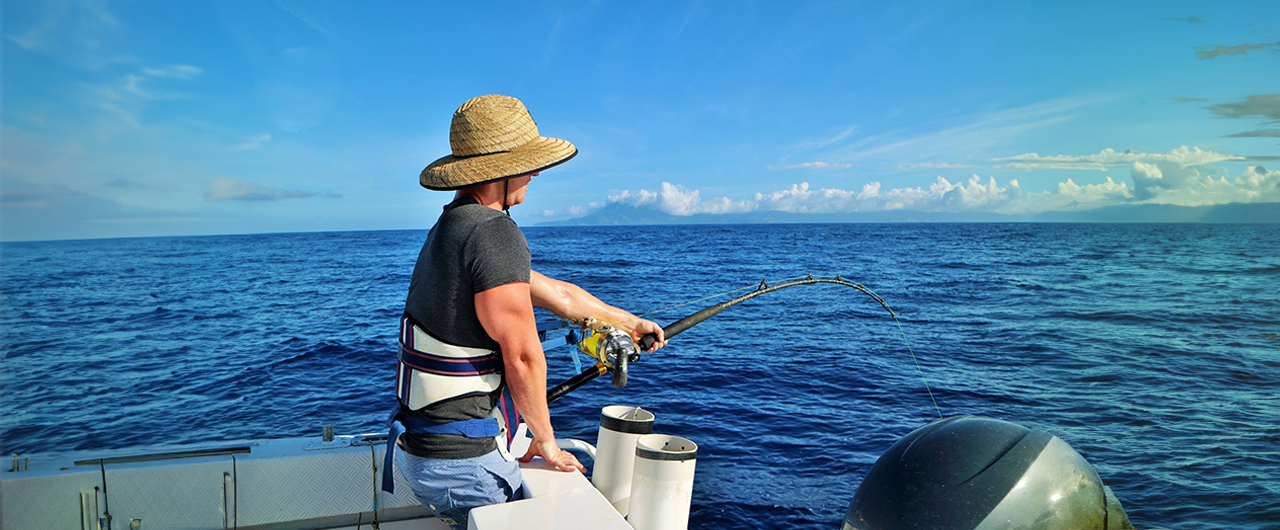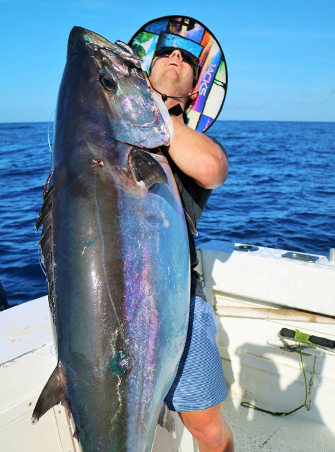Fiji Fishing


Frequently Asked Questions
Types Of Fish & Seasons
Is the fishing in Fiji any good?
Fiji is a dream for anglers, offering everything from big game pelagics like marlin, sailfish, and yellowfin tuna to reef fish like snapper and giant trevally. With nutrient-rich ocean currents and vibrant barrier reefs, there’s no shortage of action.
What fish can I catch in Fiji?
Fiji’s waters teem with fish year-round. You can catch game fish like mahi mahi and wahoo, seasonal fish like marlin, Pacific sailfish and dogtooth tuna and even reef predators like barracuda and giant trevally. Curious about the incredible variety of fish in Fiji? Discover more here.
What is the best time of year for fishing in Fiji?
You can fish year-round in Fiji and while some species have their seasons, the action never really slows down. Here’s a quick look at some popular fish species you can catch in Fiji.
| Species | Months |
| Skipjack Tuna | January – February & August – October |
| Giant Trevally | June - September |
| Sailfish | June - September |
| Wahoo | June - September |
| Dogtooth Tuna | October - March |
| Mahimahi | October – January |
| Spanish Mackerel | October – December |
| Black Marlin | November – December |
| Blue Marlin | November – January |
| Yellowfin Tuna | November – March |
Fiji Fishing Regulations
Do I need a fishing licence in Fiji?
You can’t apply for a recreational fishing licence in Fiji, but every commercial operator is required to have a commercial fishing licence which covers you.
When booking a fishing charter in Fiji, it’s important to know about qoliqoli, the traditional fishing areas owned by local Fijian communities. Part of your charter fee often goes toward the qoliqoli owners, respecting their fishing rights and supporting sustainability. Make sure your charter follows these local guidelines to help protect marine life and honor Fijian traditions before you make a booking.
What are the fishing regulations in Fiji?
Fiji’s fishing regulations cover everything from size limits to protected species like the Humphead Maori Wrasse as well as groupers and coral trout during their spawning season (June-September). Other protected marine species include the Triton Trumpet Shell, pearl oysters, giant clams, beche-de-mer and turtles.
Download the app: 4fjmovement.org app or www.fijimarinas.com/fishing-regulations-fiji/ for more details.
Booking A Fishing Charter
How can I choose a safe fishing charter in Fiji?
Check out www.fishingbooker.com for a list of all the reputable fishing charters in Fiji. A good guide is to compare online reviews and ensure that they carry insurance and a Maritime Safety Authority of Fiji certificate (all commercial fishing operators in Fiji must hold one). You can also ask to see their fishing kits and electronic equipment. Generally, the more remote you go; the more likely it is that some operators may not carry all of these.
How much does a fishing charter cost in Fiji?
There’s no standard rate, so it will vary between operators. Very occasionally, operators offer share fishing, where you can share the charter with strangers for a reduced rate. You could also join Fiji Holiday Facebook forum to find others interested in sharing a fishing charter. Note that rates may fluctuate with the fuel price in Fiji, so there may be a surcharge added.
How long is a typical fishing charter in Fiji?
Most fishing charters are booked on either a half-day or full-day basis. A half day is generally 5-6hrs while a full day charter lasts around 8-9hrs. Confirm durations with your charter.
What can I expect on a typical fishing charter in Fiji?
It’s your charter, so you get to determine what sort of fishing day you’ll have (though guides will give their opinion on your request). A full-day charter allows you to cover more ground – especially if you want to troll for deep sea fish species. Work with your guide to determine the kind of fishing you’d like to do.
Are food and drinks included on a fishing charter in Fiji?
Drinks and a light lunch are generally included on a full day charter though some operators might also offer drinks and snacks on a half-day charter. Check with your charter for details.
On The Fishing Trip
What should I bring on a fishing charter?
Polarised sunglasses, wide-brimmed hat, waterproof sunscreen, a face buff, light clothes which dry easily and sandals or shoes (no bare feet). Don’t forget seasick pills if you’re prone to seasickness!
Can I keep the fish I catch?
Some species have a strict catch-and-release policy while with other species it's not mandatory. A good rule is to always only take what you need and put the excess back. Ask your resort first if they’ll cook your fish for you or your charter operator who can cook it.
What happens if we don’t catch any fish?
You’ll always find lots of fish in Fiji but like anything in nature, its unpredictable. There’s no money-back guarantee but the thrill of the chase and being out on the water can be just as rewarding.